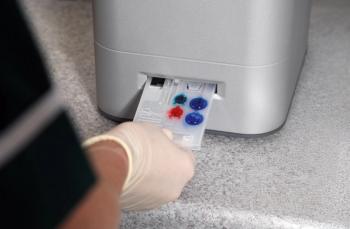
Be smarter about your hardware
Don't buy home computers for the office?even if the price seems irresistible. You'll save on aspirin when you spend a little more on business-grade machines.
It happens enough, computer experts say, that you might call it the Sunday Newspaper Syndrome. A doctor in the market for a new practice management system sees an ad in the Sunday paper for $500 desktop units at the local computer superstore. "That's what I'm buying for my hardware," he says. "You can't beat the price."
This story usually doesn't have a happy ending. Most superstore computers sold off the shelf are built for home use—basic word processing, Web browsing, and games. But in an office setting, these same computers work against you as much as they do for you. You may find it harder to run software, network machines, protect patient data, or get timely repairs.
Doctors need to buy business-grade computers. They're a little more expensive, but they're essential in a medical practice. Here's how home-grade and business-grade computers differ.
Operating systems
The latest Microsoft operating system for PCs is Windows XP. There are two versions—Windows XP Home Edition and Windows XP Professional. The home version is a fine choice for your family but a potential headache for a small business, especially when it comes to connecting your machines.
Want to run a standard client-server network, a hub-and-spoke arrangement in which client computers tap into data files stored on the server? Some practice management systems operate only on client-server networks. But you can't set one up with XP Home; you can with XP Pro. And if you daisy-chain your computers, with no single machine acting as a server (a peer-to-peer network, in geek speak), XP Home limits your network for all practical purposes to five machines since that's the number that can simultaneously share the same file. With XP Pro, this limit is 10 machines.
XP Pro offers other advantages, too—the ability to access data on an office computer from one at home, more powerful tools for backing up and restoring data, and security features that allow you to restrict access to computer files and applications. Microsoft spells out the reasons for businesses to choose XP Pro at
Application software
When you buy a business-grade computer from a reseller or online from a manufacturer, you generally can have it preinstalled with Microsoft Office XP Professional, a suite of programs that includes Microsoft Word for word processing, Excel for spreadsheets, and Access for databases. Home-grade computers from the superstore come installed with Microsoft Works, a collection of watered-down versions of Office programs. Older versions of the Works word-processing program can't open Microsoft Word files, notes Ryan Haislar, a consultant with Computerease in Collinsville, Ill. You can install Microsoft Office XP Professional on your own at a cost of $400 to $600, depending on the vendor.
What's worse, superstore computers are bursting at the seams with extra programs that don't belong in a doctor's office—games, instant messaging, Windows MovieMaker, and the like. "They invite employees to goof off," says Mark Johnson, president of MediNetwork, a Dallas medical IT firm. These programs also may run automatically when the computer's turned on, using up memory and slowing down the machine.
Hardware specifications
Any smart business worried about safeguarding its data will buy a server with redundant components—a back-up hard drive, for example, that continually records the data written on the primary drive, or a second internal power supply. You can customize a business-grade computer to give it these redundant features. But don't expect to find them on the home-grade machine advertised in the Sunday paper.
Likewise, business-grade computers usually come with the choice of a high-end Pentium 4 processor—the machine's brain. Many home-grade computers, however, rely on a cheaper Celeron processor that's considered a notch down in performance. "The Celeron could slow down your system," says David Ott, vice president of technical services for NextGen Healthcare Information Systems, which makes practice management and electronic medical record (EMR) software.
Warranties and service plans
You can't afford to have practice computers down for an extended period of time, so you need on-site repairs within 24 hours. You won't receive such speedy service if you settle for the basic factory warranty offered through the superstore. If your machine breaks down, you'll have to take it to the superstore or ship it to the manufacturer for repairs. You may not receive a loaner computer to use in the meantime.
The basic warranty is the stuff of horror stories. One solo doctor went without a computer for two weeks while his superstore computer was in the repair shop, says John Whitinger, a system engineer with practice management software vendor Microsys Computing. When the machine came back, it was stripped clean of all his practice data. What's worse, the doctor had botched backing up his data, so he had nothing to put on his repaired computer.
Purchasing tips
If you're buying a new practice management or EMR system, ask the software vendor for hardware recommendations. You'll receive a long list of specifications.
With hardware vendors like Dell and superstores like Best Buy, you can create a customized business-grade machine based on the specifications you need, though some stores may not be able to deliver all the features you request. Manufacturers and superstores also sell extended on-site service plans.
Another option is to buy your equipment from an authorized computer reseller in your area, particularly one that knows health care. Such a company can provide the quick on-site service you need. You can find resellers for Hewlett-Packard and IBM computers, for example, at their respective Web sites—
The best option may be to buy hardware through the company selling you practice management or EMR software. That way, you have the ease of a one-stop shop. If something goes wrong with either the hardware or software, you make only one phone call. You'll avoid the hassles that occur when you buy software and hardware from different companies and none of them is willing to take responsibility for a problem.
Admittedly, buying a business-grade computer isn't as simple as rushing out to the superstore and snatching up a bargain. But you'll have fewer regrets the day after.
Robert Lowes is a senior editor for Medical Economics, one of Veterinary Economics' sister publications. This article was reprinted with permission from Medical Economics, Vol. 81, No. 1, Jan. 9. Send questions or comments to
Newsletter
From exam room tips to practice management insights, get trusted veterinary news delivered straight to your inbox—subscribe to dvm360.






